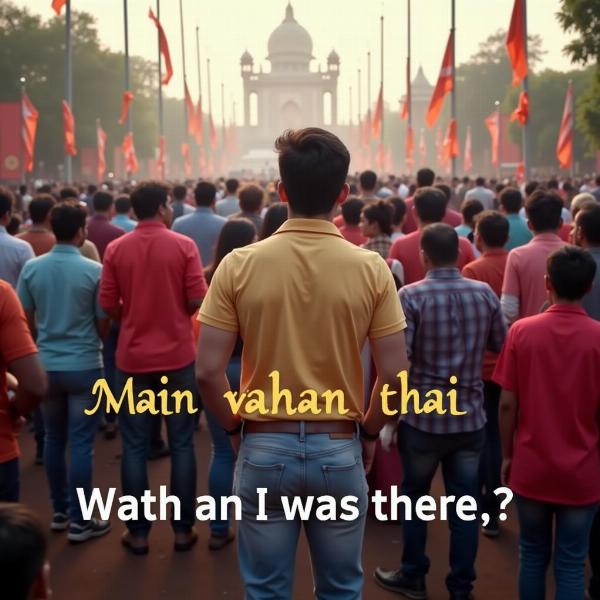Understanding the phrase “I was there” and its nuances in Hindi is crucial for effective communication. This phrase signifies not just physical presence, but also participation and experience. It often carries an implication of having witnessed something significant or having been part of a particular event. Let’s delve into the various ways to express “I was there” in Hindi and the cultural context surrounding its usage.
Different Ways to Say “I Was There” in Hindi
Hindi offers a rich tapestry of expressions to convey the meaning of “I was there,” depending on the specific context and emphasis you want to create. Here are some common translations:
- मैं वहाँ था (Main vahan tha): This is the most literal translation and is generally suitable for most situations. It simply states your presence at a specific location in the past.
- मैं वहाँ मौजूद था (Main vahan maujud tha): This emphasizes your presence more strongly, implying that you were actively present and not just coincidentally there.
- मैं उस समय वहाँ था (Main us samay vahan tha): This adds a time element, specifying that you were present at a particular moment in the past.
- मैं वहाँ गया था (Main vahan gaya tha): This implies that you went to the place in the past, suggesting a deliberate action of going there. It doesn’t necessarily emphasize the experience or witnessing of an event.
 Main Vahan Tha Meaning in Hindi – A Visual Representation
Main Vahan Tha Meaning in Hindi – A Visual Representation
Contextual Usage and Cultural Nuances
The choice of phrase depends heavily on the context. For instance, if you’re simply stating that you were at a friend’s house yesterday, “मैं वहाँ था (Main vahan tha)” suffices. However, if you’re talking about a historical event or a significant personal experience, using “मैं वहाँ मौजूद था (Main vahan maujud tha)” or “मैं उस समय वहाँ था (Main us samay vahan tha)” can add more weight to your statement.
In Indian culture, shared experiences hold great importance. Being “there” often implies a sense of belonging and connection to a specific community or event. It signifies being part of something larger than oneself, whether it’s a religious celebration, a political rally, or a family gathering.
Expressing “I Wish I Was There”
The desire to have been present at a past event is expressed differently in Hindi. Instead of directly translating “I wish I was there,” you would use phrases like:
- काश मैं वहाँ होता (Kaash main vahan hota): This is a common expression conveying a wish or regret about not being present.
- काश मैं भी वहाँ होता (Kaash main bhi vahan hota): Adding “bhi” emphasizes the feeling of missing out, especially when others were present.
Using “I Was There” in Different Scenarios
Consider these examples:
- Formal Situation: “At the conference yesterday, I was present” (कल सम्मेलन में, मैं वहाँ मौजूद था – Kal sammelan mein, main vahan maujud tha).
- Informal Conversation: “I was at the market this morning” (मैं आज सुबह बाजार में था – Main aaj subah bazaar mein tha).
- Expressing Regret: “I wish I was there at your graduation” (काश मैं आपके स्नातक स्तर पर वहाँ होता – Kaash main aapke snatak star par vahan hota).
“I was there” in Hindi is more than just a statement of location; it’s a declaration of experience and participation. Choosing the right phrase can add depth and nuance to your communication, accurately conveying your intended meaning within the rich cultural context of the Hindi language.
Conclusion
Understanding the various ways to say “i was there meaning in hindi” allows for clearer communication and demonstrates a deeper understanding of the language. Remember to choose the phrase that best suits the context and the level of formality required. Whether you’re talking about a casual event or a momentous occasion, using the right expression can significantly impact the way your message is received.
FAQs
-
What is the most common way to say “I was there” in Hindi? The most common way is “मैं वहाँ था (Main vahan tha).”
-
How do I emphasize my presence at an event in Hindi? Use “मैं वहाँ मौजूद था (Main vahan maujud tha).”
-
How do I say “I wish I was there” in Hindi? Use “काश मैं वहाँ होता (Kaash main vahan hota).”
-
Does the meaning change depending on the context? Yes, the appropriate phrase depends on the situation and level of formality.
-
Why is understanding context important when using these phrases? Context helps convey the intended meaning and nuance accurately.
Meaning-Hindi.in is your premier source for accurate and culturally sensitive Hindi translation services. We specialize in various translation needs, including business and legal documents, technical manuals, website localization, and academic papers. Our expert linguists understand the subtleties of the Hindi language and ensure your message is conveyed effectively. Need a quick translation or a specialized linguistic solution? Contact us at [email protected] or call us at +91 11-4502-7584. Meaning-Hindi.in is here to bridge the language gap and connect you with the world.